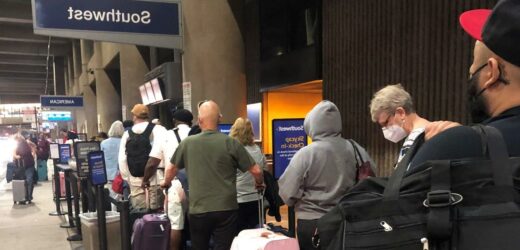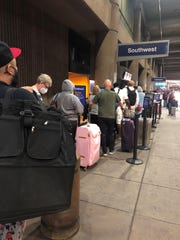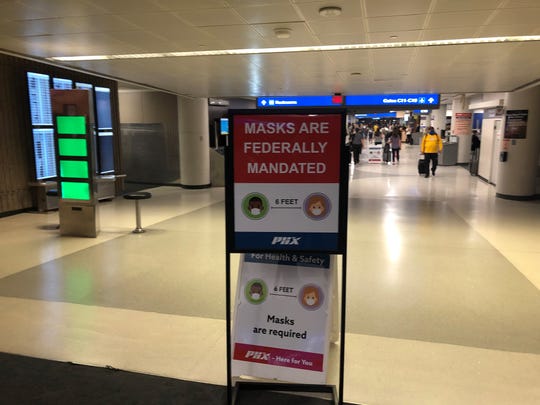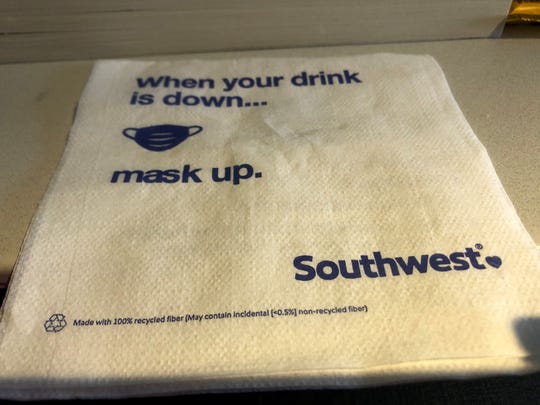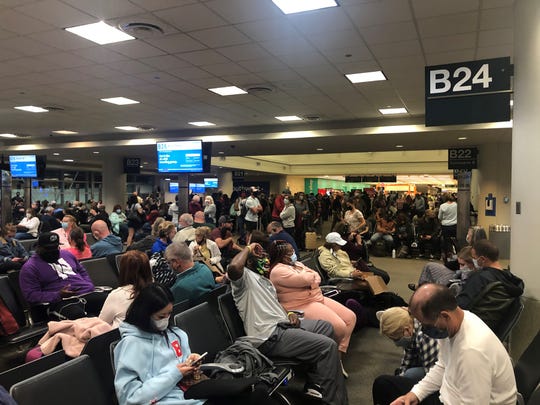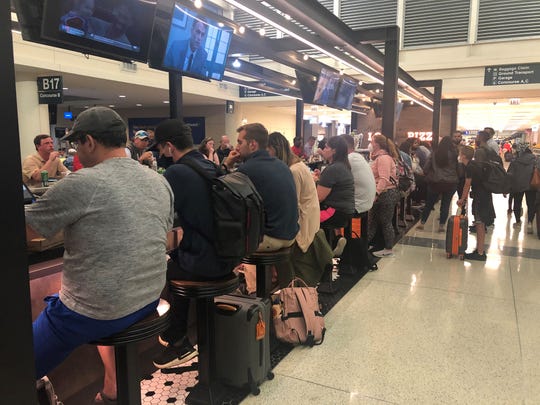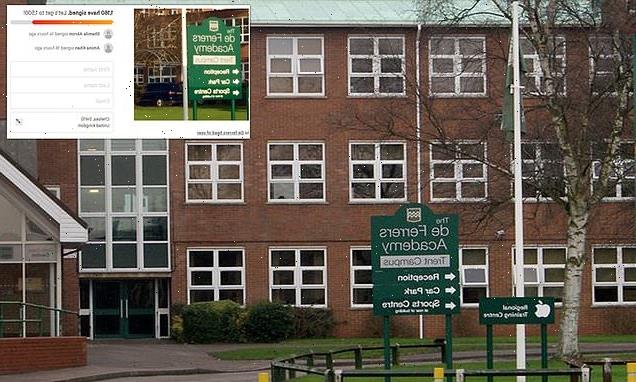A Southwest Airlines flight attendant delivered good news to passengers boarding the Providence, Rhode Island, to Chicago flight in mid-May.
“We’re not going to be completely full on this flight,” he said, directing those traveling solo to pick an aisle or window seat. “We’re spreading people out so you have a little extra elbow room.”
Don’t expect to hear that refrain on summer flights as vacation season kicks off this weekend with Memorial Day getaways. The less-than-full flight was a blast from the pandemic past, when airlines left middle seats open in the name of social distancing and planes had plenty of empty seats.
Travelers flying this summer face a return to semi-normal skies, at least within the U.S., as many cooped-up Americans take their first vacations in more than a year. Airlines say bookings have surged thanks to COVID-19 vaccinations, a reduction in COVID-19 case counts, the lifting of travel restrictions and the reopening of tourist attractions. Some U.S. airports are already back to or are exceeding pre-pandemic passenger traffic levels.
Memorial Day weekend: Here’s when NOT to hit the road for a Memorial Day trip
Summer vacation: How lockdowns, quarantines and COVID-19 testing will change summer travel in 2021
“There’s been a significant change in just a very short period of time in the number of people who are flying again,” Nicholas Calio, CEO of the airline industry trade group Airlines for America said.
Travelers who haven’t flown during the pandemic are sure to be rusty. Here’s what passengers need to know about flying in summer 2021:
Airports will be crowded this summer
Southwest Airlines passengers in line for curbside check-in at Phoenix Sky Harbor International Airport in May. (Photo: Dawn Gilbertson, USA TODAY)
The number of passengers traveling through U.S. airports each day is closing in on a key pandemic milestone: 2 million. That’s down from pre-pandemic levels of 2.4 million to 2.6 million passengers per day, but up significantly from a year ago, when passenger counts started the summer around 300,000 and never topped 1 million, according to Transportation Security Administration screening data. The 1 million mark wasn’t reached until October.
Airport traffic has been steadily increasing since spring break, with daily passenger counts above 1 million every day since mid-March.
The upshot for airline passengers: long check-in lines, snaking TSA lines during peak times and extended waits to grab that preflight coffee, snack or magazine.
“Pack your masks. Pack your patience. Pack a little extra time as you head to the airports this summer,” said Joel Bacon, executive vice president of the American Association of Airport Executives.
TSA wait times will increase this summer
The TSA has been on a hiring spree to gear up for the summer travel rebound, but officials admit passengers will face longer security lines, among other lines at the airport.
“Just as passenger volume is increasing, so too will wait times throughout your travel experience,” said Darby LaJoye, TSA acting administrator.
The agency has hired more than 3,000 employees since January, will hire an additional 1,000 by July 4th and expects to have a total of 6,000 new security officers by Labor Day.
“I’m confident in reporting that TSA is prepared and well-positioned… to help ensure that everyone who wishes to travel will do so safely and securely,” LaJoye said.
Wait no more: Seattle airport lets travelers reserve a time at TSA checkpoint
Do I have to wear a mask at the airport and on the plane?
A sign at Phoenix Sky Harbor International Airport reminds travelers that face masks are required. (Photo: Dawn Gilbertson, USA TODAY)
Despite new Centers for Disease Control and Prevention guidance that fully vaccinated Americans are safe to ditch masks, face coverings are still a must during air travel. The federal mask mandate on public transportation, including airports and airplanes, was due to expire May 11 but was extended through Sept. 13.
Airports across the country have signs about the mask mandate scattered throughout the terminals. Travelers are allowed to remove face masks at restaurants and bars.
During the flight, be prepared for repeated announcements about the mask rules, including how to properly wear masks (over your mouth and nose) and reminders to only remove masks briefly when eating or drinking. Southwest Airlines even has a reminder on its cocktail napkins.
Southwest Airlines and other airlines repeatedly remind passengers to keep their masks on during the flight except when briefly eating or drinking. (Photo: Dawn Gilbertson, USA TODAY)
Unruly passengers face travel bans, stiff fines
The number of incidents between passengers and airline crew members has increased substantially during the pandemic. Many of the scuffles have been about mask compliance.
The FAA adopted a zero-tolerance policy in January and has issued hundreds of thousands of dollars in proposed penalties.
Mask flights and BYOB breaches: FAA proposes $64,500 in fines against five unruly airline passengers
Serious Southwest scuffle: Flight attendant loses two teeth from passenger assault, union says
TSA officers haven’t been immune, with 60 physical assaults, LaJoye said.
“We want to be clear that anyone causing a disruption on board an aircraft or within the airport environment will be punished with fines and possible criminal charges,” he said. “Transportation Security Officers and transportation workers throughout the entire system have been working through this pandemic to keep the traveling public safe. Please be patient with them and show them the courtesy and respect they deserve.”
Do airlines take your temperature before boarding?
Some experts predicted widespread temperature checks during the worst of the pandemic, but it never happened, at least in the U.S. Some airports, including Los Angeles International Airport, have thermal temperature screening as passengers enter the airport, but just one U.S. airline, Frontier, takes passenger temperatures before boarding. Symptom-based screening has limited effectiveness, according to the CDC, as people who have COVID-19 may not show symptoms or fever when screened or have only mild symptoms.
Which airlines are blocking middle seats?
Middle seats are no longer empty. Delta Air Lines was the last U.S. carrier to block middle seats in economy class, and it ended the practice on May 1. Passengers will have neighbors on most summer flights.
I’m nervous about traveling again. Are airports and airlines still practicing social distancing?
Social distancing is largely a thing of the pandemic past during check-in, at the gate and during boarding and deplaning.
Airlines and airports tried to encourage social distancing among passengers throughout the pandemic. In addition to blocking some seats, they switched up boarding policies, put stickers on the floor and every other chair in the gate area to space people out, and made in-flight announcements about deplaning by rows.
The results were mixed from the start as passenger habits are hard to break, but with lighter crowds, social distancing wasn’t an issue for most. With travel surging again, travelers will find crowded check-in lobbies, gate areas and the usual rush to get on and off the plane during boarding and deplaning.
“Just remember what it’s like to be among a crowd of people … and remember how you act,” said George Novak, president of the National Air Carrier Association, which represents low-cost airlines, including Spirit, Frontier and Allegiant.
Skittish travelers should arrive early and search for an empty gate, restaurant, or quiet corner somewhere to avoid throngs of fellow passengers.
End of pandemic era: Southwest resumes pre-pandemic boarding
A crowded gate area at Chicago's Midway International Airport in mid-May. (Photo: Dawn Gilbertson, USA TODAY)
Are airlines serving food and drinks during the pandemic?
Airlines cut back or eliminated in-flight food and drink service in the pandemic’s early months to reduce contact between passengers and flight attendants. Many only served water and snacks, if that, in economy.
They have been gradually adding food and drinks back as passengers return, but in-flight menus are far from back to normal.
Alcohol sales have been the slowest to resume given flight attendant concerns about travelers leaving masks off for extended periods and the potential for more unruly behavior.
Southwest is bringing back alcohol sales on Hawaii flights on June 24 and most flights on July 14, albeit with a shorter menu of drinks.
Alaska Airlines resumed alcohol sales in the main cabin on May 19, and United plans to start selling beer, wine and White Claw hard seltzer in economy on June 1. American Airlines, which will add soda to its in-flight drink lineup on June 1, said it plans to reintroduce alcohol and food sales in economy later this summer. Delta has been serving alcohol, including new Tip Top canned cocktails, in regular economy since mid-April and will introduce a custom beer from SweetWater Brewing during Memorial Day weekend.
Are airport restaurants, bars and shops open during COVID-19?
Airports were ghost towns in the early months of the pandemic, with restaurants, bars and shops shuttered. Finding preflight coffee or a drink often meant a long walk to a long line or a long wait for a seat at a bar.
The situation has dramatically improved as travel has rebounded, though things certainly aren’t back to normal at most airports. One complicating factor: staffing issues.
At Phoenix Sky Harbor International Airport in early May, I had to jump out of a line at a retail shop after 15 minutes to make the boarding for my flight, leaving a bag of SkinnyPop popcorn and a Diet Mountain Dew behind.
Airport bars are filling up again as travel demand rebounds. Bars and restaurants that were spacing out seating are no longer doing so at many airports, including Chicago's Midway International Airport, but seats are still hard to find. (Photo: Dawn Gilbertson, USA TODAY)
At Chicago’s Midway International Airport in mid-May, the bookstore I was browsing in closed before 8 p.m. despite a busy terminal. And there was a wait to find an open seat at the bars.
The best advice: Arrive at the airport extra early or pack your own food and an empty water bottle to fill up past security.
If you are fully vaccinated, is it safe to travel?
The CDC said in early April that fully vaccinated Americans could resume travel with low risk to themselves, but agency officials still advised staying home.
Do you have to be vaccinated to fly within the US?
You don’t need to be vaccinated to fly within the United States. However, some international destinations, including popular European vacation spots, are only reopening to vaccinated visitors for now. So check the requirements carefully before booking a trip. Airline websites have detailed information on requirements and restrictions as do tourism websites and travel websites.
Have COVID vaccine, will travel: These are the countries open to fully vaccinated Americans
Do you need a negative COVID-19 test to fly within the US?
Travelers don’t need a negative COVID-19 test to board a flight within the United States. But some destinations do require a negative test to bypass travel restrictions, including quarantines, so be aware of the rules or risk spending all or part of your vacation in isolation. In the U.S., Hawaii has the strictest policy, requiring visitors from the mainland to provide a negative COVID-19 test from approved health care providers upon arrival or face a mandatory 10-day quarantine at their expense, even if they are vaccinated. (Travelers are not allowed to test upon landing to meet the requirement. The negative result must be received prior to departure from the mainland.) Hawaii Gov. David Ige this week said he expects to change the rules to allow vaccinated visitors to be exempt from the requirement later this summer. Maui requires an additional test upon landing, but vaccinated travelers are exempt from that.
At-home COVID tests for sale at a drugstore. The CDC now allows at-home tests to be used to meet its requirement of a negative test before boarding international flights to the United States. (Photo: Dawn Gilbertson, USA TODAY)
Flying internationally? You’ll need a negative COVID-19 test to get home, even if you’re vaccinated
Since late January the CDC has required all passengers boarding international flights to the U.S., including U.S. citizens, to show proof of a negative COVID-19 test taken no more than three days before departure or proof of recovery from COVID-19 within the past 90 days. Vaccinated travelers are not exempt.
Good news on this front: The CDC is now accepting approved at-home tests to meet the requirement. Before packing a test to use ahead of the flight home, however, travelers need to check travel information for their destination because the CDC says some countries may restrict importing tests that aren’t authorized or registered there.
United Airlines has partnered with eMed to offer this option directly to passengers, who must order the kit before their trip. They are sold in groups of six for $150.
Source: Read Full Article
